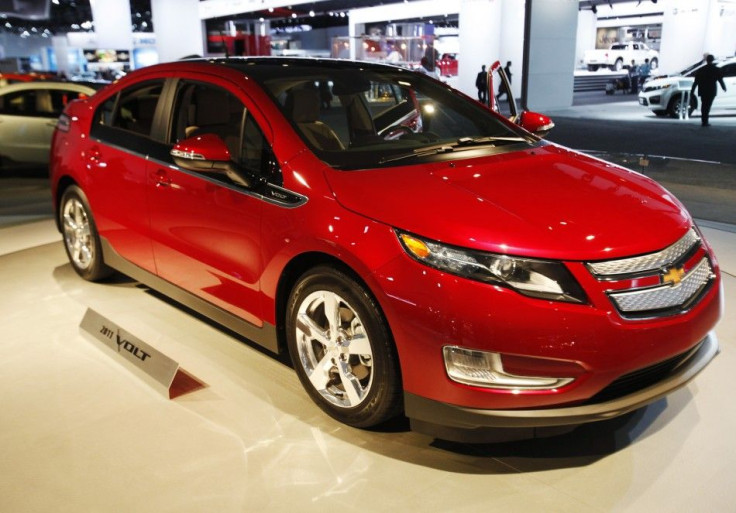Chevy Volt: Can GM Restore Electric Vehicle's Image After Fire Safety Investigation?

General Motors has effectively cleared one hurdle in its quest to market the Chevrolet Volt to the mass market. But the bigger hurdle is the one that has remained throughout the Volt's existence: Are Americans ready for an electric car?
Last week, the U.S. National Highway Traffic Safety Administration closed its investigation into fires that had occurred in Volts days or weeks after crash tests. The agency concluded in its investigation that Volts and other electric vehicles were not at an increased risk of fires when compared to gasoline-powered vehicles.
Based on the available data, NHTSA does not believe that the plug-in Chevy Volts or other electric vehicles pose a greater risk of fire than gasoline-powered vehicles. Generally all vehicles have some risk of fire in the event of a serious crash, the NHTSA said in a statement Friday.
With that, GM resumes its attempt to build up the Volt brand, one that never really took off in its first full year on the market in 2011. GM's efforts to rehabilitate the Volt brand, will answer several questions. Did the fires and resulting high-profile investigation ruin whatever good image the Volt attained? Will it hurt sales of other electric vehicles? And, finally, back to the big hurdle: Will any rebound in 2012 be enough to save the Volt?
Questions abound, not answers. Though GM rode the momentum of the auto industry's comeback in 2011 -- last week again becoming the most successful global automaker in terms of sales -- its model for the company's electric vision faltered.
GM is proud of the technological innovation the Volt represents, the company said in a statement after the conclusion of the NHTSA investigation. We appreciate the confidence our Volt customers continued to provide during the investigation. Our overriding commitment will always be to provide our customers with the best ownership experience and peace of mind in the industry and we're focused on delivering that every day.
But will GM experience similar confidence from new customers looking to buy a new car? Declining consumer interest in the Volt has led to declining dealer interest, and that has forced GM to restructure its sales targets for 2012. It had hoped to sell 60,000 Volts worldwide, but adjusted that forecast ahead of the 2012 North American International Auto Show in Detroit earlier this month. Last year, GM missed its goal of 10,000 sold Volts by nearly 2,500.
Michael Omotoso, an analyst at LMC Automotive, said he expected only slight consumer backlash from the investigation. Its effect is lessened somewhat because the fires occurred as a result of crash tests and not from a consumer-owned vehicle. Still, he said, consumers will see the headlines.
I would say they'll be affected somewhat, Omotoso said. There's going to be that public perception. They're going to see the headlines of, 'Electric vehicles' and 'fire.'
I think the effect will be a small, negative one initially. But as long as there are no incidents with buyers, that fear will go away over time.
It's too early for much of an effect from the NHTSA investigation, but already some Chevrolet dealers are scaling back their supply of Volts amid little consumer interest. A source told Automotive News that 14 New York City-area dealerships only accepted 31 of a potential 104 Volts in December.
At least one New York-area dealer, though, sees the opposite at his dealership. John Bruno Jr., the president of Potamkin Cadillac Buick Chevrolet Pontiac in Manhattan, said in a phone interview Tuesday his dealership, as well as most of his competitors in the tri-state area, have had success selling the Volt.
Anyone that's been interested in the Volt, Bruno said, we've been able to place them in a car.
But across the country, sentiment seems to differ. Bruno admits the New York market draws more of an interest for novelty vehicles, like the plug-in Volt.
But according to a December survey from Pike research, only 40 percent of respondents said they're very or extremely interested in purchasing a new plug-in vehicle. That's down from 44 percent in 2010 and 48 percent in 2009.
Omotoso thinks some of that demand will improve once electric vehicles become cheaper. He expects the prices of lithium-ion batteries to plunge as manufacturers sell to more companies developing electric vehicles. But he questions whether vehicles like the Volt will ever become completely mainstream.
Electric vehicles already face an uphill battle because of limited range and high cost, Omotoso said. We do expect the next generation Volt to have its production cost come down. That'll help improve profitability and possibly drop the selling price as well. That'll make it more attractive to consumers.
But I don't think it will ever be a huge seller. It only appeals to a limited number of consumers.
© Copyright IBTimes 2025. All rights reserved.





















